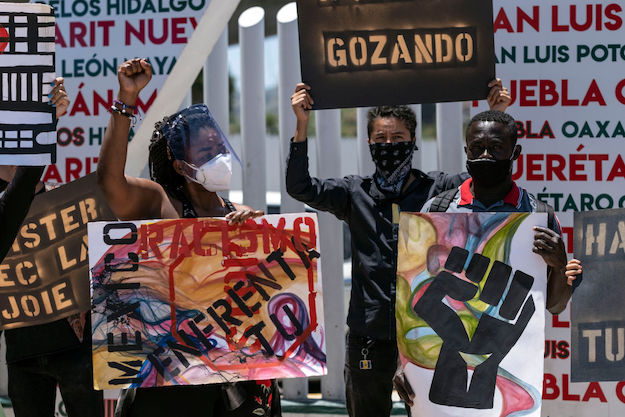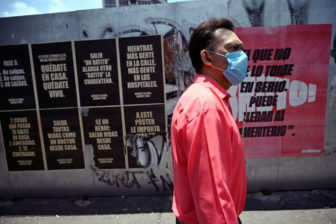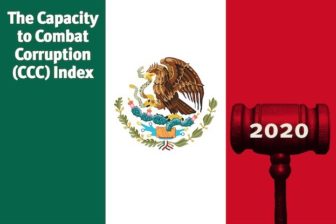MEXICO CITY – The global anti-racism movement landed loudly in Mexico City. George Floyd’s murder in May sparked angry protests outside the U.S. embassy and – in a country where many dismiss racism as an American problem – a period of self-reflection in newspaper columns, public events and on social media.
But a long delayed conversation on the meaning of race in Mexico has been overshadowed in recent days by politics, celebrity and a combustible debate over so-called cancel culture.
In a week of controversy, the head of Mexico’s anti-discrimination agency resigned, HBO suspended one of the country’s most watched comedians from its airwaves, and President Andrés Manuel López Obrador, who in February ran afoul of gender violence protesters, again came under fire for his response to social justice issues.
In the middle of it all was an online forum scheduled for June 17 by Mexico’s National Council to Prevent Discrimination (CONAPRED) titled “Racism and/or Classism in Mexico?”
“We were very critical of the event, first of all, because they presented it as if it were a question,” José Antonio Aguilar, founder of RacismoMX, an advocacy group, told AQ.
That question echoes a widely held view in Mexico that racism isn’t a national issue, experts say. Part of the reason is the “myth of mestizaje” – a mistaken idea that the country shares the same mixed racial heritage, and that it’s therefore impossible, or at least unlikely, for racial prejudice to motivate discrimination, said Alice Krozer, who researches socioeconomic inequality at the Colegio de México.
“It’s surreal that people don’t believe in racism in a society where it’s so clearly evident,” Krozer told AQ. “Mestizaje is very far from reality, but it’s something people have internalized.”
Backlash to the CONAPRED event, which was ultimately canceled, focused not only on its title but, more intensely, on its choice in panelists: Namely, the inclusion of Chumel Torres, a comedian whose internet show’s Facebook page once allegedly posted that an indigenous Barbie would “sweep and mop …. just like in real life.”
Beatriz Gutiérrez, the first lady, was one of the most influential critics of Torres’ invitation to participate. In 2019, the comedian mocked Gutiérrez and López Obrador’s then 12-year-old son with a nickname that appeared based on his physical appearance. “You invited this person to a forum on discrimination?” Gutiérrez tweeted. “I’m still waiting for his public apology.”
Amid the uproar – and pointed criticism from the president – Mónica Maccise, CONAPRED’s director since last year, resigned her post on June 19. The same day, HBO Latin America said it would suspend Torres’ popular TV show while it examines allegations of racism based on his social media posts.
López Obrador claimed that he hadn’t even heard of CONAPRED before the controversy. “We have to fight racism … but we don’t need to create a government agency for every demand,” he said, suggesting that the agency could be folded into the interior ministry. The statement added fuel to broader concerns over López Obrador’s efforts to centralize government authority, as did a pledge to assess the continued need for “over 100” existing independent bodies.
Public response to Torres’ suspension, meanwhile, has been divided. Social media followers quickly offered support, with many suggesting he had been targeted more for his frequent criticism of the government than for his comedy. Several prominent commentators, most of whom stopped short of endorsing Torres’ sense of humor, suggested he had been the victim, at best, of a double standard.
“HBO has a history of providing a platform for transgressive and uncomfortable comedy,” tweeted León Krauze. “What makes Chumel Torres different?”
Torres has since posted a video saying that he was hoping to “build bridges” during the forum and issued an apology of sorts to Gutiérrez (who he blames for the event’s cancellation). But the back and forth has distracted from what experts see as an opportunity, as the world focuses on issues of systemic racism, for Mexico to break taboos and correct widely held misconceptions.
“Using the word ‘racism’ in this country still creates resistance in public debate,” Fabiola Fernández Guerra Carrillo of the Collective to Eliminate Racism in Mexico (COPERA) told AQ. “You can imagine what it was like 10 years ago.”
Government and independent studies show that socioeconomic outcomes in Mexico do indeed correlate to skin tone. According to a 2019 Oxfam report, 35% of Mexicans who self-identify as dark skinned and 72% of those who speak an indigenous language fall in the bottom quartile of an index that measures occupational, educational and economic indicators. Both are well above the national average.
Mexico’s often-ignored Afro-descendant community has also been left behind. After decades of campaigning by COPERA and others, it was only this year that the national census – postponed over coronavirus concerns – offered respondents the option to self-identify as Afro-Mexican. A 2015 poll showed that at least 1.4 million Mexicans consider themselves part of that group.
“It’s in the last three or four years that we’ve moved from ‘let’s talk about racism,’ to ‘what are we doing to do about it?” Fernández said.
Indeed, despite the current controversy, rights campaigners believe they have momentum. COPERA plans to host a workshop on the history and context of racism in Mexico for journalists. RacismoMX, a day after the CONAPRED event was supposed to take place, held its own version of the discussion (called “Racism Isn’t a Joke”) with some of the original panelists – including Torres.
“It wasn’t an easy decision, but as a civil society organization we thought we could take the risk, because we aren’t in a position of authority,” Aguilar said of agreeing to hold the event.
CONAPRED, meanwhile, has seen an outpouring of support since Maccise’s resignation. Multiple members of its advisory committee have resigned in protest over what they view as the president’s attacks on its independence. And some of the forum’s most vocal critics have defended the organization as an essential piece of efforts to bring the conversation on racism in Mexico out into the open.
“CONAPRED should have more responsibilities, more capacity, more power, and above all more resources,” Aguilar said. “It would be a mistake to think that it could disappear. On the contrary, it should be strengthened.”









